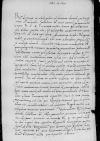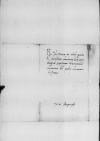List #2164
Jan Benedyktowicz SOLFA do Ioannes DANTISCUSCracow (Kraków), 1539-06-14
| odebrano [1539]-08-15 Rękopiśmienne podstawy źródłowe:
| ||||
Tekst + aparat krytyczny + komentarzZwykły tekstTekst + komentarzTekst + aparat krytyczny
Reverendissimo in Christo Patri et Domino, domino
Reverendissime in Christo Pater et Domine, domine gratiosissime et colende.
Salutem et rerum omnium exsuperantiam ms. exsuperantium(!) ⌈exsuperantiamexsuperantiam ms. exsuperantium(!) ⌉ cupio Reverendissimae Dominationi Vestrae.
Vehementer, Reverendissime Domine, libellum de secta Mametica sermone latino, quem scio, Hispano sermone in manibus Reverendissimae Paternitatis Vestrae, quem nullus in hoc
Valeat faustiter et suos canonicos diligat, praesertim plebanum Bochnensem solito prosequatur amore.
Dat(ae) or Dat(um)⌈Dat(ae)Dat(ae) or Dat(um)⌉
Eiusdem Reverendissimae Paternitatis Vestrae



 BCz, 1597, p. 682
BCz, 1597, p. 682